Globo Gym employs a highly-trained, quasi-cultural staff of personal alteration specialists. And with our competitively-priced on-site cosmetic surgery, we can turn that Frankenstein you see in the mirror every morning into a Franken-fine!
Of course you’ll still be you in a legal sense, but think of it as a thinner, more attractive, better you than you could ever become without us.
-White Goodman, Dodgeball: The Movie
There are some REALLY bad personal trainers out there. Conversely, there are some AMAZING trainers out there, and they can be the missing link between you and sustainable, consistent progress (or even an elite level of athletic performance).
Back in 2002, I thought I knew everything there was to know about working out (I had been training in a gym for 6 years by then).
Back in 2002, I was also an idiot.
But when I joined a gym that gave me some free personal trainer sessions, my world suddenly got a lot larger. After talking to the trainer and being handed a complete workout and nutrition strategy that was drastically different from what I had been doing for the 6 years prior – and having more success in a month than I had ever had before – I had an epiphany: “I am an ignoramus and a doofus, and I have a lot to learn.”
As I transformed personally and started formulating the ideas that became Nerd Fitness years later, I took a weekend-long personal trainer certification class as required by my local gym, and saw first hand all these soon to be “trainers” that were about to get certified. The range of experience, education, enthusiasm, and professionalism varied DRASTICALLY from person to person.
I came to realize that this particular certification (as with many others) was more of a “start your fitness professional journey” rather than a test of actually qualifying whether you knew your stuff. In short, many certifications are just the tip of the iceberg when determining if your trainer is worth a damn.
A good trainer is worth every penny they charge. (I know my current virtual coach is the best money I spend each month!)
A bad trainer is not only a waste of your time and money, but can set you back months or even years in your training. You’ll get no results, and waste valuable time/money in the process.
Unfortunately, many trainers just don’t give a damn; they’re going through the motions, not providing a program that provides lasting results.
Today, I want to talk about how you can avoid the bad trainers and find the good ones. They’re not cheap, but the amount of money you spend doesn’t always determine their quality.
Speaking of trainers, I want to quickly share why we have our own coaching program. There’s nothing worse than spending 6+ months in a gym and doing what you think you SHOULD be doing, only to step on the scale and realize that you haven’t made any progress!
If you’re somebody that’s worried about wasting time, or you want to have an expert hand craft a workout and nutrition program that’s based on your current situation, consider checking out our really popular 1-on-1 Online Training Program!
I’ve been training with an online coach for the past 4 years and it has been the biggest boost for me in the world.
Click on the image below to schedule a free call with our team to see if online coaching is the path that could work for you!
If you’re going to hire a trainer, here’s how to find a good one.
Make sure you know what you want first
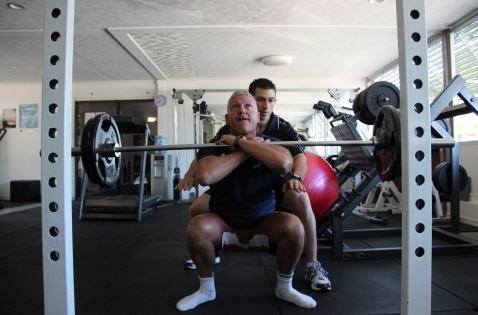
First and foremost, understand that your diet is 80-90% of the battle.
Even if you worked with a trainer for 60-90 minutes every day, that still leaves you with 22-23 hours per day to screw things up if you don’t eat properly! Hopefully your trainer will also help you craft a nutritional strategy in addition to helping you build a workout strategy that aligns with your goals.
Start by picking your goals first and determine if a trainer you’re paired up with is the right fit for you. Like dating, you can meet somebody who’s amazing but not right for you. If somebody is a competitive marathon runner, they might not be a great powerlifting coach, and vice versa.
So, start with your goals:
- Are you trying to lose 300 pounds? 30 pounds? Get to 10% body fat?
- Are you trying to get stronger or hold your first handstand?
- Do you want to become a competitive powerlifter?
- Are you looking to run your first marathon?
- Do you just want to feel better about yourself and enjoy exercise?
These goals will largely determine the type of trainer you’re looking for.
Make sure your trainer has expertise in the area you want to train in. Expertise in one area does not necessarily make them a good fit in another!
After that, you’ll want to think about what you NEED:
- Are you just looking for a powerlifting coach to show you the basics (squat, deadlift, etc.) so your form is right? Just a few sessions up front and a few later down the line to confirm you’re on the right path might suffice.
- Are you new to working out or looking to kick start your first 2 months of training with 2 sessions per week to keep you disciplined?
- What type of person are you? Do you need more hands-on guidance throughout your workouts, or more space to take ownership and thrive on your own? Do you need somebody who will cheer you on or do you need tough love from somebody to call you on your bullshit?
Once you set proper expectations with what you want and how long you need a trainer for, then you can pick out one that hopefully will work for you.
How to spot a good trainer
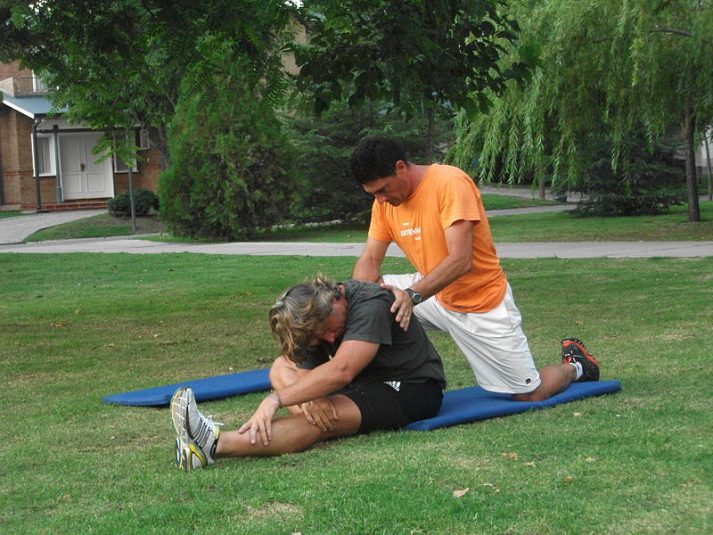
Once you find a trainer you are considering working with, the next steps should always be an in-depth conversation.
Before they do anything else…
They SHOULD be listening to you completely and hearing your story.
They SHOULD ask about any past issues with injuries or experience with exercise. If you’re injured or have any deficiencies, they should know this so they can create a great program for you.
They SHOULD ask you about your nutrition. If they don’t ask about your nutrition, you’re going to be wasting your time.
They SHOULD practice what they preach. They don’t have to be an Olympian, but should have a healthy lifestyle.
They SHOULD tell you about their expertise and how they can help you. They should be able to share past successes of clients with you or point to their credentials and history of success.
They SHOULD set proper expectations. You won’t get ripped in a month, but they can let you know it could take many months to get in shape or build the right kind of habits.
That’s what to look for. Here’s what to watch out for!
Red flags to watch out for

Beware the “entertainment exercise” trainers with a routine that isn’t catered to your goals.
These are the trainers that just try to confuse you with needlessly complex movements and put all their clients through roughly the same cookie-cutter plan because they know it makes them look knowledgeable without actually knowing anything.
“Now balance on this bosu ball while doing these dumbbell squat lunge curls and standing on one foot with your tongue out! Muscle confusion!”
Tough workouts are great, but remember that while it’s easy to get someone tired, it’s hard to help someone improve over time.
Sure, it might elevate your heart rate and tire you out, but if it’s not building towards your goals in a way that you couldn’t do at home, what are you paying for?
They might also have just obtained a basic certification and stopped their education there, relying on ‘conventional wisdom’ rather than doing the research and building the experience.
If they say any of the following phrases, run for the high hills:
“Yeah you don’t want to squat too low – it’s bad for your knees.”
“Use this machine; it’s safer for you than the free weights.” (unless it’s due to a pre-existing injury you might have)
“Yes, you should be using mostly your back. That’s why it’s called the back squat”
“Now, you’re going to want to cut the fat out of your diet…”
“These (ab) exercise will burn fat from your stomach in no time” (You can’t spot reduce fat.)
I have overheard all of these sound bites from real trainers in real gyms, and it made me weep like the Native American in the 1970s pollution ad:
Your trainer should be results-focused, not focused on scheduling you a new session and keeping you around. I often see clients working with trainers for months and months and that client never looks any different; the trainer is just interested in cashing another check.
Remember, they work for YOU: Don’t let them build a program that doesn’t actually fit your needs. Do you have injuries they’re working around? Do they pick a plan out of a hat and put you through it without focusing on your goals?
Are they actually following along with you? Are they checking your form on movements? Are they encouraging or helping you succeed in the way you want to be encouraged? Or are they scrolling through Instagram models on their phones while you’re doing your sets?
Are they putting in time so they can see you get results? Or are they putting in time so they can check the box and collect your money?
You’re paying money for this person’s expertise and attention – it’s not too much to ask to find somebody who takes those things seriously.
What are good certifications to look for? How much should a trainer cost?

There are a wide variety of personal trainer certifications and other “credibility indicators.”
The more traditional path – a degree in exercise science or kinesiology may mean the trainer in question is knowledgeable about the human body, but doesn’t speak to any experience they may or may not have coaching in real world circumstances.
Five of the most popular certifications are NSCA, ACSM, NASM, ACE, and Crossfit. T-Nation provides a rundown of the pros and cons from a trainer perspective that we feel is useful insight from a client’s perspective. Be sure to check them out if you want to learn more about what’s behind your trainer’s certification.
CrossFit certifications are completed in a single weekend. While a CrossFit certification does not make a trainer bad (there are plenty of excellent CrossFit coaches out there), it does not guarantee excellence. Here are our thoughts on CrossFit, by the way.
A certification from NPTI – the National Personal Training Institute – is a credential gained from going to a full school on personal training (rather than attending a class or taking a test). While no certification can fully promise excellence, in our experience trainers with NPTI certifications are worth your consideration.
After all that, I’d be remiss if I didn’t mention that I know plenty of trainers who have NO certification that are incredible, and I know other trainers who have the most elite certifications who aren’t that good. A certification can be a starting point, but don’t let it be the determining factor.
In fact, one of the most important things to look for in your trainer isn’t a credential or certification at all, but real experience and an enthusiasm for helping you reach your goals.
Are you looking to powerlift or get into Olympic lifting? Look for someone who has successfully competed in their fields, or someone who actually coaches athletes who do compete! In our view, finding a trainer with proven experience and a track record of performing or coaching (or both) in the area of your goals is the most valuable step you can take to ensure quality. The credential is only a starting point.
Trainers aren’t cheap, but the benefits can be priceless. Remember, you aren’t paying simply for their time with you, but for the years and years they’ve spent learning, training, and coaching. It’s the years behind the certification that makes their time so valuable, so expect the cost of a trainer to be significantly more than the cost of a basic membership at your gym.
In my personal experience, I’ve been working with an online coach since 2014 and it’s the best money I spend every month.
Find the right coach, and it’s worth every. freaking. penny.
SHOULD I HIRE AN ONLINE PERSONAL TRAINER? WHAT ARE THE PROS AND CONS OF AN ONLINE PERSONAL TRAINER?

I’m naturally going to be super biased on this question, because as I’ve mentioned, I’ve been working with an online trainer for the past four years, and it’s what allowed me to prove an internet troll wrong!
Okay, maybe I’m also biased because we offer 1-on-1 online personal training too. However, let’s chat about this honestly because there are some pros and cons to virtual vs. in-person coaching.
Pros to Online Personal Training:
Freedom to fit your schedule. With an online personal coach, you can train when and where you want to fit your schedule – your coach builds the workout program for you ahead of time, so you can fit it in at your convenience. Compare this to a traditional coach, and you’re at the mercy of their busy schedule. If they only have time Friday morning at 8am, and you’re not a morning person, conflict ensues.
Persistent worldwide accountability. I’m borrowing this phrase from a NF Coaching Client, Jeff (his success story is great). No matter where in the globe you are, your online trainer comes with you. Which means the accountability never stops. If you travel for work, your coach can plan for that and build you a special travel routine. Getting relocated for work? No problem – your coach will still be there.
Nutritional guidance. With most traditional personal trainers, you engage with them only during your scheduled visits: they help you work out and that’s about it. With an online personal trainer, you’re connected whenever you have access to the internet. And I would imagine that MOST online coaching programs, work with you on the most important part of the equation: nutrition. AKA everything that happens in the 23 hours outside of the gym.
More cost-effective. Most in person personal trainers are expensive, especially if you work out with them two or three times a week. That’s because if your trainer is working with you, they can’t work with anybody else at the same time. When you work with an online coach, because you aren’t training with them 1-on-1 in the gym, they can provide more cost effective guidance.
When you factor in their availability via chat and their help on habits and your nutrition, you’re looking at a life changing experience if you find a coach that fits your personality.
When comparing online coaches versus regular coaches, I’m going to share the cons as if you have the option between a GREAT online coach and a GREAT in-person coach.
Neither of those are guaranteed.
Here are the cons of an online coach when compared against a real life equivalent:
Your coach can’t do the work for you. There’s nothing stopping you from skipping your workout and lying to your online coach that you did it. Nobody wins in this scenario, but I can totally see it happening.
So yeah, an online coach can’t pick up the weight for you, and they can’t yell at you to put down the donut. You have to do the work!
No real time feedback and instant form check. If you’re learning how to powerlift, or you’re going for a particular heavy lift, having a coach right there is HUGE. They can tell you to move your squat slightly wider. They can guide you through the movement and consistently remind you – even when tired – to keep great form.
Although we do form check videos, where we have coaches and clients send clips back and forth to each other, it’s not the same as having somebody critique you in real time.
If you’re looking to nail a particularly challenging lift, or learn a dangerous gymnastics move, working with a trained professional in person is invaluable.
The value of sunk cost. If you pay for a month of online coaching, there’s nothing inherently motivating you to go to the gym when it’s cold and you’re tired – your coach can’t yell at you, and you’re not letting anybody down in the moment when you don’t make it.
Compare this to working with a real coach in person. You paid $100 for a session, and if you don’t show up, that money is *POOF* gone. So you tell yourself, “I already paid for this, and my coach is gonna be mad, I should probably go.” And then you go. And you’re so glad that you did.
Although your online coach can notice that you haven’t signed in on your app, and they can ask what’s going on, this is after the fact compared to an in-person coach getting stood up.
There’s a lot to consider when debating in-person training vs. an online coach. I wouldn’t say one format is clearly better than or superior to another. It really depends on what you’re after and the circumstances of your situation.
MY PERSONAL EXPERIENCE: I’ve been working with an online trainer for the past 4 years. It’s truly been life changing for me. I had some goals that had evaded me despite a DECADE of effort, and it took a great coach to coax out the right strategy. It’s how I say (jokingly) that I went from Steve Rogers to Captain America.
And it was my coach’s programming that got me a 420 pound deadlift at a bodyweight of 172 pounds:
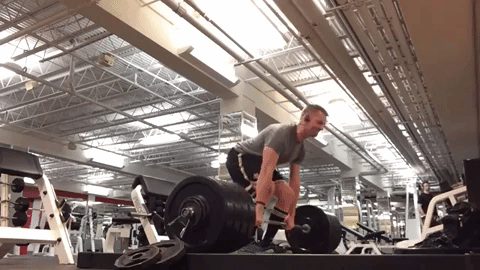
I’m not gonna set any powerlifting records, but I’m healthier, more antifragile, and stronger each and every month, and I’m damn proud of that. For somebody that can’t afford a top-of-the-line professional coach for each session, having an online coach to build your programming and guide your food choices is a verrrrry close second.
Next steps
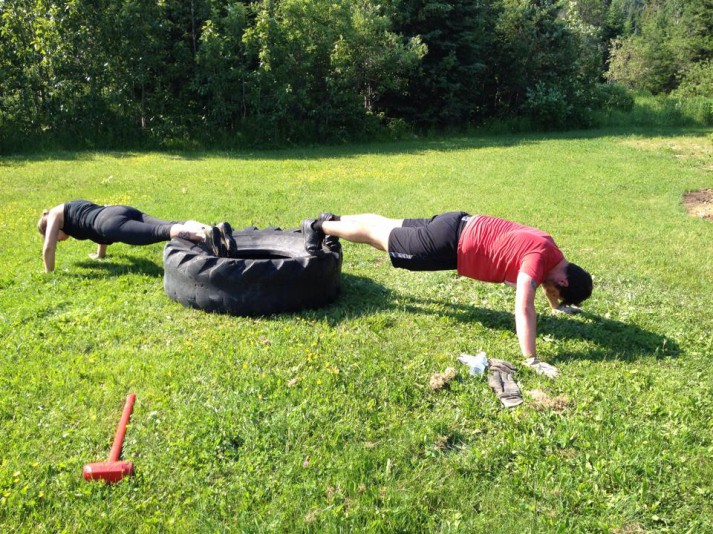
Here’s my advice: give a trainer 5-10 sessions before making a decision that things aren’t working out (sessions are often sold at a discount in a package).
The first session is often exploratory, explanatory, and introductory, and the trainer needs to test your limits and movements to build upon that. This isn’t a “get fit quick” strategy, but rather one that could take months and months for you to find the right person to aid you on your journey. Don’t expect miracles in a day!
A few words of warning:
DO NOT USE YOUR TRAINER AS AN EXCUSE: Too many people will hire up a trainer and give no effort in the gym or the kitchen. Then, when they fail to see results they can turn to their friends and say “man, my trainer is terrible, THAT’S why I’m not losing weight/getting stronger/etc.” This happens so much more often than you’d think. A trainer is a guide, like Morpheus. You have to take the pill and walk through the door yourself.
MAKE CRITICISM CONSTRUCTIVE CRITICISM! Often when the trainer asks them to do something (walk every day, throw away junk food, eat a vegetable), the client/trainee comes back with 1,001 reasons they can’t do that. No compromise, no discussion of possible solutions. Instead of saying “no,” offer an alternative solution and negotiate a plan: “I don’t really like broccoli, do you have a good recipe?”
IF YOU ENJOY WORKING WITH YOUR TRAINER: Let them know and continue working with them. The more information you can give them on your progress, the easier it will be for them to alter your program as you go on.
IF YOU DON’T ENJOY WORKING WITH YOUR TRAINER: That’s okay too. Not all relationships end in marriages. Some first dates suck, and some trainers aren’t what you need. I think you can be honest with them and let them know that it’s not a good fit and you will not be continuing to work with them. Good trainers at this point will ask what they could have done better. Trainers who are simply after your money may guilt trip you or beg you to stick around. Try somebody new and keep the search going.
Remember: this is a lifelong quest, and you’re on the hunt for a great guide to help you on your journey. They won’t do the work for you, and they can’t work miracles. Have proper expectations, do what you’re told, and this could be the best investment you’ll make in your entire life!
Trainers in the Rebellion, what did I miss?
Those who have had experience working with Trainers, any wisdom to share from your experience?
One final note: Going to a gym is intimidating, especially if you’re starting out. And not knowing the difference between a bad trainer (who is all talk) and a good trainer (who will prioritize your needs and get you results) can result in months of lost effort (not to mention lots of lost money too!)
It’s why we created our own experience for our community.
If you are in a location where there aren’t any great trainers, you don’t have access to a gym, or you’re just not ready to work with somebody in person, consider checking out uber popular 1-on-1 Online Coaching Program!
We build a workout program specific to YOUR goals, we help you make better food choices (which is 90% of the battle), and we help keep you accountable.
No guesswork. No confusion about what to do next. Just a coach you can text with questions, that builds a program for you, and can even check your form via video!
Schedule a free call to learn more by clicking on the image below:
If you have questions about what you need to look for when it comes to training with a coach in person, or even questions about working with an online trainer, leave them in the comments below so I can chime in!
-Steve
###
photo: wikimedia: high five, Gregg Wass: Trainer, Wikimedia: Spot, Bicycle, Wikimedia: stretchins
source https://www.nerdfitness.com/blog/how-to-hire-a-good-personal-trainer/


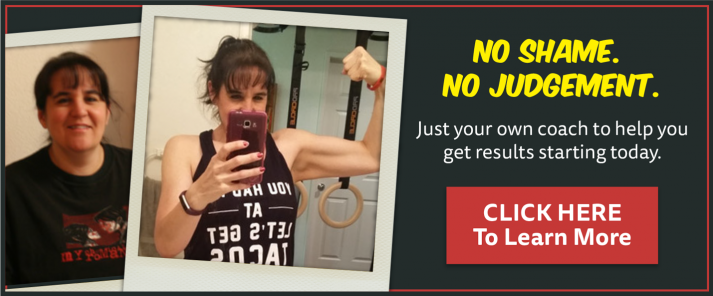
No comments:
Post a Comment